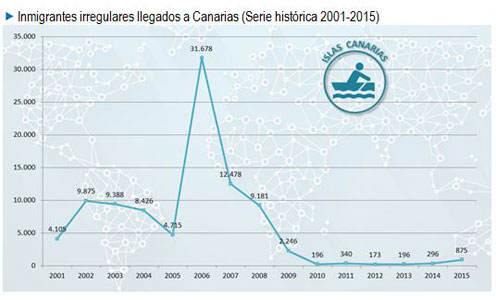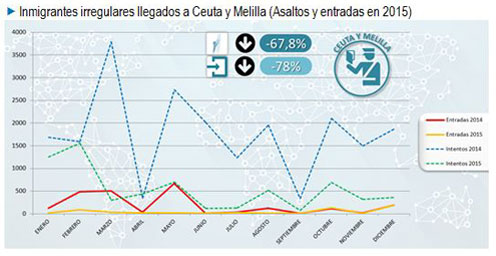2015 balance in fight against illegal immigration
5,312 illegal immigrants arrived on Spanish coasts in 2015 compared with 4,552 in 2014
News - 2016.9.14
Strong migratory pressure towards Spain seen in recent years in addition to the rising flow of refugees from Syria has led to an increase in illegal immigrants in 2015, particularly through the land borders of Ceuta and Melilla. In 2011, 5,443 illegal immigrants arrived (up 49.8%), 3,804 in 2012 (down 30%), 3,237 in 2013 (down 15%) and 4,552 in 2014 (up 40.6%).
However, the number of illegal immigrants arriving in Spain by sea is significantly lower than the 157,220 posted in the Central Mediterranean, the 880,820 posted in the Eastern Mediterranean and the 763,958 posted along the Balkan route, according to data from the European agency FRONTEX.
Despite the slight increase posted in 2015, the immigration management model implemented by the Ministry of Home Affairs is the main factor in the maintenance of the general trend of the global figures on the flows of illegal immigration from Africa.
The results obtained in recent years are based on a joint work ethic of efficiency and commitment, with noteworthy actions in regard to:
- The daily task of the National Police and the Guardia Civil
- The responses from the Ministry for Home Affairs adapted to the new challenges of the immigration networks
- The consolidated collaboration between Spain and the main countries of origin and transit of illegal immigration
Arrivals of illegal immigrants to mainland, Balearic Islands and Canary Islands
A total of 4,437 illegal immigrants reached the mainland or the Balearic Islands in 2015, compared with 4,256 in 2014. This is a rise of 187 on the previous years, a slight increase of 4.3%.
The downward trend is particularly significant in the period 2006-2015. While 7,502 illegal immigrants reached the mainland or Balearic Islands in 2006, only 4,437 arrived in 2015, a 40.8% decline. In the case of the Canary Islands, this figure has plummeted from 31,678 illegal immigrants in 2006 to only 875 in 2015, a decline of 97.2%.
However, and despite the good results seen in the fight against illegal immigration in the Canary Islands over recent years, 2015 closed with the arrival of 875 immigrants, 579 more than in 2014, when only 296 illegal immigrants reached the shores of the islands.
It should be pointed out that this increase does not alter the downward trend being seen year after year in the fight against illegal immigration in the Canary Islands, as can be patently seen in the historical series from 2001 to 2015 (see chart).
 Ministerio del Interior
Ministerio del Interior
Arrival of illegal immigrants in Ceuta and Melilla
Ceuta and Melilla posted a year-on-year rise of illegal immigrants trying to gain access to the two autonomous cities in 2015, either by swimming to their shores, hidden in vehicles or other means of transport, or by breaching the border perimeter.
Specifically, a total of 11,624 illegal immigrants reached Ceuta or Melilla in 2015, a rise of 55.3%, or 4,139, on 2014, when 7,485 gained access.
In 2015, attempts to breach the border perimeter to Ceuta and Melilla fell by 67.8% and arrivals in the two cities by this means fell by 78%, thanks to the dissuasive methods employed by the State law enforcement agencies (see chart).
 Ministerio del Interior
Ministerio del Interior
It should be pointed out that of the 7,485 illegal immigrants to arrive in Ceuta or Melilla in 2014, 3,305 were from Syria and 4.180 from other countries. This figure rose in 2015 with the arrival of 11.624 illegal immigrants, of which 7,189 were potential refugees from Syria while 4,435 were of other nationalities.
In this regard, 7,164 refugees reached Melilla from Syria in 2015, 78.1% of the total, compared with 3,072 in 2014, 52.8% of the total. This is a rise of 133.2%, or 4,092 refugees more than in the previous year.
The International Protection Offices inaugurated by the Minister for Home Affairs, Jorge Fernández Díaz, in 2015, at the border posts in Ceuta and Melilla to help cope with the already existing number of claims for asylum, have allowed the arrival of this number of Syrian refugees at the border with Ceuta, and particularly Melilla, to be handled more efficiently.
Repatriation
In 2015, the Ministry for Home Affairs repatriated a total of 20,091 illegal immigrants, down by 4.3% (902 fewer) on the total of 20,993 in 2014, the fourth straight year of declines.
Entry denied
- (People turned back at official border posts such as ports and airports)
Entry denials fell by 0.5% from 8,109 in 2014 to 8,069 in 2015, or 40 fewer.
Readmissions
- (People who have crossed the border between Spain and France, or between Spain and Portugal, and have been intercepted and returned to the country they have left by virtue of the bilateral treaties in place between these countries)
Readmissions posted a 33.8% increase, from 1,067 in 2014 to 1,428 in 2015, or 361 more.
Returns
- (People who tried to enter Spain through non-official border posts)
Returns fell by 9.6% from 4,121 cases in 2014 to 3,725 in 2015, or 396 fewer.
Expulsions
- (People intercepted in Spain without the corresponding documentation)
There were 6,869 expulsions in 2015 compared with 7,696 in 2014, a decline of 10.7% (827 fewer cases).
Qualified expulsions
The Ministry for Home Affairs organises the repatriation of foreign offenders with numerous criminal and/or judicial offences, links to terrorism, organised crime, gender-based violence or any other serious criminal offence that represents a threat to public safety. These expulsions are subject to a court order and include a ban on re-entry to Spain or to other Member States of the Schengen zone.
Out of the total of 6,869 expulsions carried out in 2015, 5,539 were qualified expulsions (81%) and 1,330 non-qualified expulsions (19%), compared with 6,557 qualified expulsions and 1,139 non-qualified expulsions (out of a total of 8,984 expulsions in 2014). In 2015, qualified expulsions represented 81% of the total, down four points on 2014, while non-qualified expulsions rose by four points to stand at 19%.
Once again, the policy of the Ministry for Home Affairs to prioritise qualified expulsions (individuals tied to criminal activities) was consolidated in 2015, rather than focusing on foreigners unlawfully residing in Spain.





